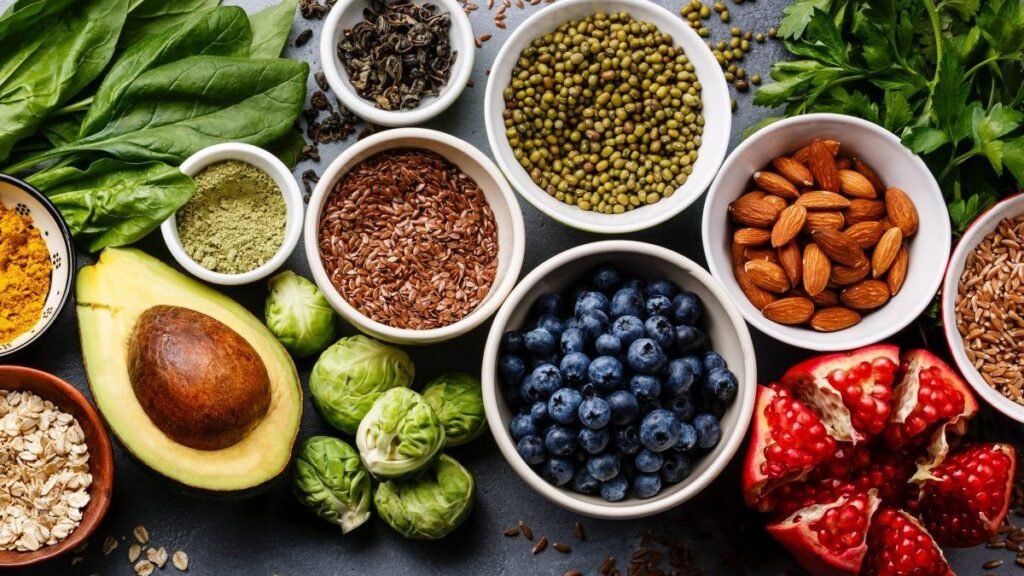Superfoods | 10 Best Superfood You Should Be Eating
Superfoods are nutrient-rich foods that are packed with an abundance of vitamins, minerals, antioxidants, and other beneficial compounds. These foods are believed to have a higher concentration of nutrients compared to other foods and are often hailed as having powerful health benefits.
There are many different superfoods available, each with its own unique set of nutrients and benefits. Some popular superfoods include berries, leafy greens, nuts, seeds, and whole grains.

Berries are a great source of antioxidants and have been shown to have a number of health benefits, including reducing inflammation and improving heart health. Some of the most popular berries include blueberries, strawberries, and raspberries.
Leafy greens are another group of superfoods that are packed with nutrients. These include vegetables like kale, spinach, and broccoli. Leafy greens are high in vitamins and minerals, as well as fiber and antioxidants. They have been linked to a number of health benefits, including reducing the risk of heart disease and cancer.
Nuts and seeds are also considered superfoods due to their high nutrient content. These include nuts like almonds, cashews, and peanuts, as well as seeds like chia, flax, and sunflower. Nuts and seeds are high in healthy fats, protein, and fiber, and have been shown to improve heart health, lower cholesterol, and reduce the risk of chronic diseases.
Whole grains are another type of superfood that are high in nutrients and beneficial for overall health. These include grains like quinoa, oats, and brown rice. Whole grains are high in fiber and have been linked to a number of health benefits, including reducing the risk of heart disease, diabetes, and certain types of cancer.
In addition to these commonly known superfoods, there are also many lesser-known foods that have been dubbed superfoods due to their high nutrient content and health benefits. Some of these include:
- Acai berries: These small purple berries are native to Central and South America and are high in antioxidants, fiber, and healthy fats. They have been linked to improved heart health and weight loss.
- Kale: Packed with antioxidants, vitamins, minerals, and fiber, kale is one of the healthiest superfoods you can eat. It’s great in salads, soups, and smoothies.
- Blueberries: Not only are blueberries tasty, but they’re also high in antioxidants and phytonutrients, which can reduce inflammation and help protect against disease.
- Avocados: These creamy fruits are a great source of healthy fats and fiber. They’re also high in potassium, magnesium, and vitamins C, K, and B6.
- Chlorella: This type of algae is high in nutrients, including protein, fiber, and various vitamins and minerals. It has been shown to improve immune function, reduce inflammation, and improve heart health.
- Goji berries: These small red berries are native to Asia and are high in antioxidants, vitamin C, and other beneficial compounds. They have been linked to improved immune function, brain health, and weight loss.
- Matcha: This type of green tea is high in antioxidants and has been shown to improve heart health, boost metabolism, and reduce stress.
- Maca root: This root vegetable is native to South America and is high in nutrients, including protein, fiber, and various vitamins and minerals. It has been shown to improve energy, mood, and fertility.
- Chia Seeds: These tiny seeds are packed with fiber, protein, and omega-3 fatty acids. They’re great in smoothies, oatmeal, and baked goods.
- Quinoa: This gluten-free grain is high in protein and fiber. It’s also a good source of iron, magnesium, and B vitamins.
While these foods have been hailed as superfoods due to their high nutrient content and potential health benefits, it’s important to remember that they should be consumed as part of a balanced diet. No single food can provide all of the nutrients we need, so it’s important to incorporate a variety of foods into our diets in order to maintain optimal health.
Furthermore, some superfoods may not be suitable for everyone. For example, nuts and seeds may be a problem for people with nut allergies, and certain grains may be problematic for those with celiac disease or gluten sensitivity. It’s important to consult with a healthcare professional or registered dietitian before adding any new superfoods to your diet.
Follow Bakasur For More !!!

